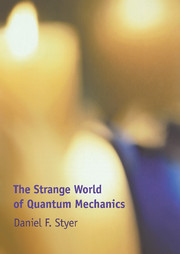Book contents
- Frontmatter
- Dedication
- Epigraph
- Contents
- Preface
- 1 Introduction
- 2 Classical Magnetic Needles
- 3 The Stern–Gerlach Experiment
- 4 The Conundrum of Projections; Repeated Measurements
- 5 Probability
- 6 The Einstein–Podolsky–Rosen Paradox
- 7 Variations on a Theme by Einstein
- 8 Optical Interference
- 9 Quantal Interference
- 10 Amplitudes
- 11 Working with Amplitudes
- 12 Two-Slit Inventions
- 13 Quantum Cryptography
- 14 Quantum Mechanics of a Bouncing Ball
- 15 The Wavefunction
- Appendix A A Brief History of Quantum Mechanics
- Appendix B Putting Weirdness to Work
- Appendix C Sources
- Appendix D General Questions
- Appendix E Bibliography
- Appendix F Skeleton Answers for Selected Problems
- Index
- References
7 - Variations on a Theme by Einstein
Published online by Cambridge University Press: 05 August 2014
- Frontmatter
- Dedication
- Epigraph
- Contents
- Preface
- 1 Introduction
- 2 Classical Magnetic Needles
- 3 The Stern–Gerlach Experiment
- 4 The Conundrum of Projections; Repeated Measurements
- 5 Probability
- 6 The Einstein–Podolsky–Rosen Paradox
- 7 Variations on a Theme by Einstein
- 8 Optical Interference
- 9 Quantal Interference
- 10 Amplitudes
- 11 Working with Amplitudes
- 12 Two-Slit Inventions
- 13 Quantum Cryptography
- 14 Quantum Mechanics of a Bouncing Ball
- 15 The Wavefunction
- Appendix A A Brief History of Quantum Mechanics
- Appendix B Putting Weirdness to Work
- Appendix C Sources
- Appendix D General Questions
- Appendix E Bibliography
- Appendix F Skeleton Answers for Selected Problems
- Index
- References
Summary
The previous chapter covered the most important aspects of the Einstein–Podolsky–Rosen conundrum. But some interesting new features have come up since Aspect performed his experiments, and I thought you might enjoy them, so I'll mention two of them here. You may skip this chapter without interrupting the flow of the book's argument.
The results of the Aspect experiment were welcomed by most scientists as a final confirmation of the principles of quantum mechanics, principles that had already been verified magnificently in numerous experiments that were not as clean nor as easy to understand as the test of Bell's theorem. But scientists also looked for possible flaws in the confirmation, and they found one. We have discussed an ideal experiment, in which the source produces a pair of atoms and each tilting analyzer detects one of them. But in Aspect's real experiment, it often happened that after the source launched its atoms only one of the two atoms was detected, and sometimes neither of them were. This is not surprising: perhaps one of the atoms collided with a stray nitrogen molecule and was deflected away from its detector, or perhaps the detector electronics were pausing to reset after detecting one atom when a second atom rushed in. For these reasons, in analyzing his experiment Aspect ignored cases where only one atom was detected. But another possibility is that each atom is generated with an instruction set which could include the instruction “don't detect me”. If this possibility is admitted, then one can invent local deterministic schemes that are consistent with Aspect's experimental results.
- Type
- Chapter
- Information
- The Strange World of Quantum Mechanics , pp. 49 - 56Publisher: Cambridge University PressPrint publication year: 2000



